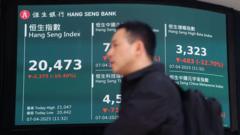Major indexes feel the impact of newly announced tariffs, causing investors to brace for economic fallout.
**Asian Markets in Turmoil Amidst U.S. Tariff Shockwaves**

**Asian Markets in Turmoil Amidst U.S. Tariff Shockwaves**
Asian stock exchanges experience a significant plunge as U.S. tariffs raise global trade tensions.
The Asian stock market experienced a dramatic decline as fallout from recent U.S. tariffs reverberated through global economies. On Monday, major indexes, including those in Shanghai, Tokyo, Sydney, and Hong Kong, plummeted at the opening bell, leading analysts to describe the situation as a "bloodbath." As nations in the region serve as key manufacturers for global goods, the tariffs imposed by U.S. President Donald Trump have directly affected their markets, exacerbating fears of an impending global trade war and potential recession.
By midday Monday, Japan's Nikkei 225 slid 6%, while the Australian ASX 200 dropped 4%, along with a 4.7% decline in South Korea's Kospi index. The slumps were further intensified by raises in tariffs affecting countries that were identified as significant U.S. export markets. Investors in mainland China, Hong Kong, and Taiwan caught up to the substantial losses from the previous week's market downturn, with the Shanghai Composite falling over 6% and the Hang Seng and Taiwan Weighted Index plummeting around 10%.
Concerns around inflation and the likelihood of a recession are fueling market fears. Julia Lee, Head of FTSE Russell, highlighted that expectations are driving market behaviors, with Goldman Sachs now estimating that the probability of a U.S. recession within a year has climbed to 45%, an increase from 35%. Other financial institutions, including JPMorgan, anticipate a 60% chance of recession both in the U.S. and globally.
The impact of the tariffs is not limited to immediate market fluctuations; countries across Asia, particularly those with substantial export relations with the U.S. such as Vietnam and Bangladesh, are particularly vulnerable. Trump's recent tariff announcements included a staggering 46% tax on imports from Vietnam and 37% on goods from Bangladesh. These economies depend heavily on their export markets, with Bangladesh contributing $8.4 billion annually in garment exports to the U.S.
Frank Lavin, a former Undersecretary for International Trade, pointed out that Asia is disproportionately affected by the turmoil, as the region sends more exports to the U.S. compared to other markets. The repercussions of escalating trade tensions mean that a slowdown in the U.S. economy could significantly undermine Asian exports, posing long-term risks to these nations.
The widening global stock market decline reflects increased investor anxiety, with U.S. major indexes facing severe losses—over 5% across the board—while the U.K. experienced its worst fall in five years, alongside significant declines in European exchanges. Analysts, like Lee, predict continued volatility, with futures markets indicating further decreases as traders brace for a rocky session ahead on Wall Street. Global stock markets have experienced unprecedented knocks, with trillions lost in value following the introduction of sweeping new import taxes on goods from various nations, intensifying uncertainties in international trade relations.
By midday Monday, Japan's Nikkei 225 slid 6%, while the Australian ASX 200 dropped 4%, along with a 4.7% decline in South Korea's Kospi index. The slumps were further intensified by raises in tariffs affecting countries that were identified as significant U.S. export markets. Investors in mainland China, Hong Kong, and Taiwan caught up to the substantial losses from the previous week's market downturn, with the Shanghai Composite falling over 6% and the Hang Seng and Taiwan Weighted Index plummeting around 10%.
Concerns around inflation and the likelihood of a recession are fueling market fears. Julia Lee, Head of FTSE Russell, highlighted that expectations are driving market behaviors, with Goldman Sachs now estimating that the probability of a U.S. recession within a year has climbed to 45%, an increase from 35%. Other financial institutions, including JPMorgan, anticipate a 60% chance of recession both in the U.S. and globally.
The impact of the tariffs is not limited to immediate market fluctuations; countries across Asia, particularly those with substantial export relations with the U.S. such as Vietnam and Bangladesh, are particularly vulnerable. Trump's recent tariff announcements included a staggering 46% tax on imports from Vietnam and 37% on goods from Bangladesh. These economies depend heavily on their export markets, with Bangladesh contributing $8.4 billion annually in garment exports to the U.S.
Frank Lavin, a former Undersecretary for International Trade, pointed out that Asia is disproportionately affected by the turmoil, as the region sends more exports to the U.S. compared to other markets. The repercussions of escalating trade tensions mean that a slowdown in the U.S. economy could significantly undermine Asian exports, posing long-term risks to these nations.
The widening global stock market decline reflects increased investor anxiety, with U.S. major indexes facing severe losses—over 5% across the board—while the U.K. experienced its worst fall in five years, alongside significant declines in European exchanges. Analysts, like Lee, predict continued volatility, with futures markets indicating further decreases as traders brace for a rocky session ahead on Wall Street. Global stock markets have experienced unprecedented knocks, with trillions lost in value following the introduction of sweeping new import taxes on goods from various nations, intensifying uncertainties in international trade relations.



















